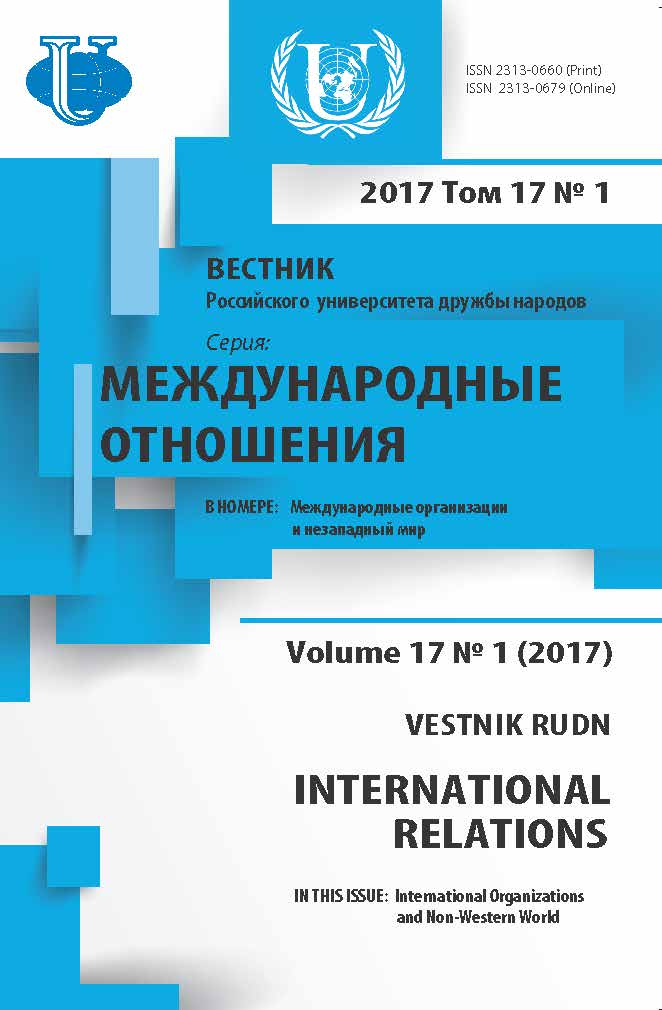The processes of transformation of the education system and science in Asia in the estimates of international organizations and transnational ranking agencies
- 作者: Koldunova E.V.1, Lounev S.I.1
-
隶属关系:
- Moscow State Institute of International Relations (MGIMO University), Ministry of Foreign Affairs of the Russian Federation
- 期: 卷 17, 编号 1 (2017): International organizations and Non-Western World
- 页面: 190-200
- 栏目: INTERNATIONAL EDUCATIONAL COOPERATION
- URL: https://journals.rudn.ru/international-relations/article/view/15888
- DOI: https://doi.org/10.22363/2313-0660-2017-17-1-190-200
- ID: 15888
如何引用文章
全文:
详细
The article presents a historiographical review of assessments of higher education and science development in Asia, which has now become the key economic region of the world. It is a common knowledge that education, science and innovations represent a driving force of economic development and indispensable for building a knowledge-based economy. The analysis presented in this article adds to a better understanding of knowledge-based economy development in Greater Eastern Asia. The article presents the research literature and science metrics analysis on science and education development in Asia dividing it into four clusters. International organizations (e.g., the UN and OECD) and transnational ranking agencies (like QS) judging by the quantitative indicators point out that Greater Eastern Asia (Northeast Asia, Southeast Asia and India) has become one of the world leaders in terms of higher education development and innovations. In high technologies, the region is second only to the USA and is constantly bridging this gap. Greater Middle East (the Middle East and Central Asia) looks differently in this respect. Arab countries’ opportunities to build knowledge-based economy are very limited as well as those of Central Asia. In terms of quality of science and education Greater Eastern Asia (with the exception of the most advanced countries of the region) is still lagging behind the West and in terms of fundamental science this gap looks very serious. However, there are efforts in place to make the rise of science and education in Asia more quality-oriented, for instance focusing more on strengthening engineering and hard science in the Asian universities.
作者简介
Ekaterina Koldunova
Moscow State Institute of International Relations (MGIMO University), Ministry of Foreign Affairs of the Russian Federation
编辑信件的主要联系方式.
Email: e.koldunova@inno.mgimo.ru
Moscow, Russia
Sergei Lounev
Moscow State Institute of International Relations (MGIMO University), Ministry of Foreign Affairs of the Russian Federation
Email: silounev@gmail.com
Moscow, Russia
参考
- Amir, S. (2013). The Technological State in Indonesia: The Co-constitution of High Technology and Authoritarian Politics. Abingron: Routledge.
- Chao, R. (2014). Paths to an East Asian Higher Education Area: A Comparative Analysis of East Asian and European Regionalization Processes. Higher Education. 68 (4), 559—575.
- Chen, K. (2010). Asia as a Method: Towards Deimperialization. Durham and London: Duke University Press.
- A Doctor in the House: the Memoir of the Fourth Prime Minister of Malaysia. (2015). Vol. 1—2. Moscow: MGIMO-Universitet. (In Russ.).
- Findlay, C., & Tierney, W. (eds). (2010). Globalization and Tertiary Education in the Asia-Pacific: The Changing Nature of a Dynamic Market. Singapore: World Scientific.
- Greater China’s Quest for Innovation. (2008). Rowen, H. S., Hancock, M. G., & Miller, W.F. (eds). Stanford: Stanford University.
- Koldunova, E. V. (2012). An University creates social and human capital. Mezhdunarodnaya zhizn. Spetsialnyiy vyipusk ATES Rossiya 2012, 127—134. (In Russ.).
- Lee, Kuan Yew. (2016). From Third World to First. The Singapore Story 1965—2000. Moscow: Mann, Ivanov i Farber. (In Russ.).
- Lounev, S. I., & Koldunova, E. V. (2015). The Development of Social and Political Thought, Technology and Science in the Largest Countries of Asia. Moscow: Academia. (In Russ.).
- Lounev, S. I., & Lyubimov, Yu. V. (2011). Can the East Catch up with the West (the Development of Science and Education in the Largest Countries of Asia)? Moscow: MGIMO-Universitet. (In Russ.).
- Mahbubani, K. (2009). Can Asians Think? Singapore: Marshall Cavendish Editions.
- Mahbubani, K. (2013). The Great Convergence: Asia, the West and the Logic of One World. N.Y.: Public Affairs.
- Nandy, A. (1998). Defining a New Cosmopolitanism: Towards a Dialogue of Asian Civilizations. In: Chen K.-H., editor. Trajectories: Inter-Asia Cultural Studies. London: Routledge; p. 142—149.
- Paths to a World-Class University: Lessons from Practices and Experiences. (2011). Liu, N. C., Wang, Q., & Cheng, Y. (eds.) Rotterdam: Sense Publishers.
- Sen, A. (1998). Universal Truths: Human Rights and the Westernizing Illusion // Harvard International Review, 20 (3), 40—43.
- Shih, Ch. (2013). Sinicizing International Relations: Self, Civilization, and Intellectual Politics in Subaltern East Asia. NY: Palgrave Macmillan.
- Simon, D., & Cao, C. (2009). China’s Emerging Technological Edge: Assessing the Role of High-End Talent. NY: Cambridge University Press.
- The Routledge International Handbook of Higher Education. (2009). Tight, M., Mok, K. H., Huisman, J., & Morphew, C. C. (eds). Abington: Routledge.
- Universities in Transition: The Changing Role and Challenges for Academic Institutions. (2011). Görensson, B., & Brundenius, C. (eds). NY, Dordrecht, Heidelberg, London: Springer.
- World Complex Regional Studies. Voskresenskii A. D. (ed). (2014). Moscow: Magistr Infra-M Publ. (In Russ.).
- Doing International Regional Studies and World Politics. Voskresenskii A. D. (ed.). (2016). Moscow: Magistr Infra-M Publ. (In Russ.).
- Wang, H. (2007). The Politics of Imagining Asia: A Geneological Analysis // Inter-Asia Cultural Studies. 8(1), 1—33.
补充文件








